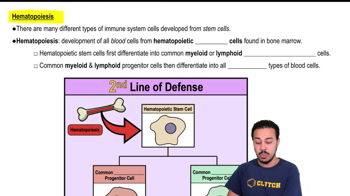Albumin
a. is a blood buffer.
b. helps maintain blood's osmotic pressure.
c. distributes body heat.
d. transports certain molecules.
 Verified step by step guidance
Verified step by step guidance Verified video answer for a similar problem:
Verified video answer for a similar problem:



 6:11m
6:11mMaster Functions of Blood with a bite sized video explanation from Bruce Bryan
Start learning